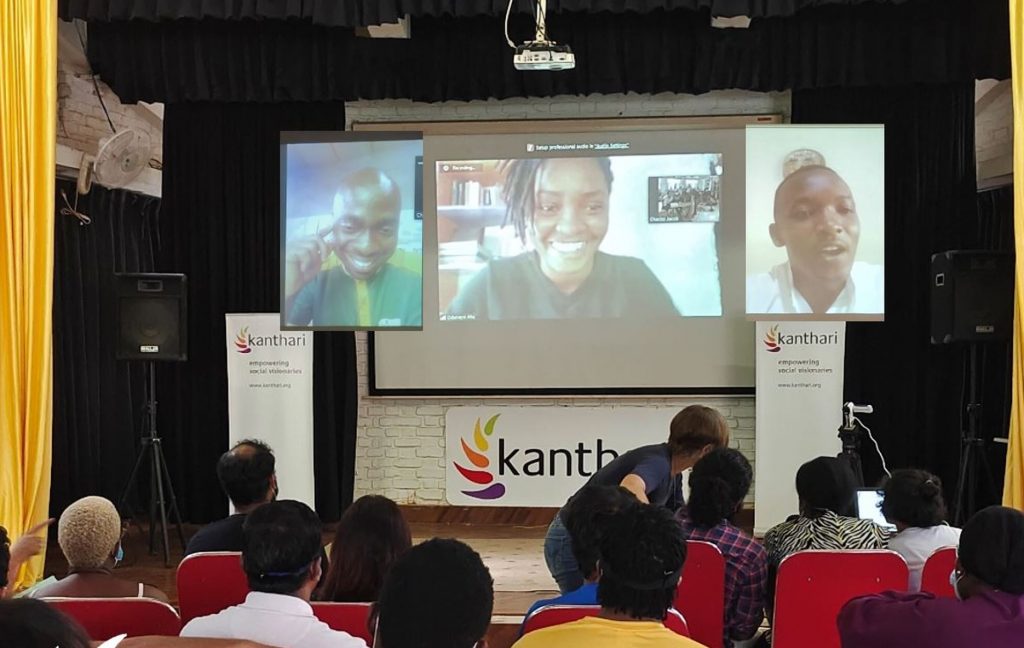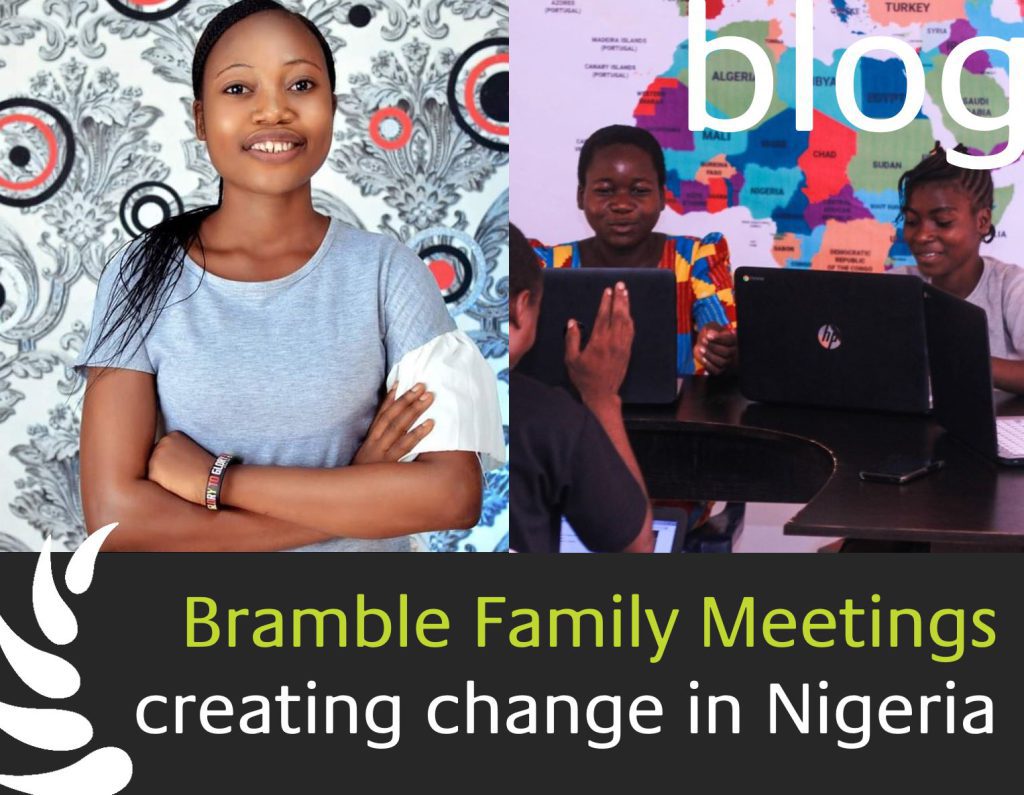By Akhina and Biman, 2021 kanthari participants
Every year, at kanthari there is an exciting journey to look forward to; the Exposure trip. As the name suggests, it is a learning experience for all kanthari participants by physically visiting different non-profits across the South of India. They interact with the founders, beneficiaries, stakeholders, ask lots of questions, and come back to the campus with some great insights and new ideas.
As we had been on campus from the start of the course till date, we had very much wished to travel, but the Covid-19 situation prevented the same. So, the kanthari team came up with a different solution. Virtual exposure visits to projects of kanthari graduates in Africa. Though not being able to do a physical visit put our energy level a bit down, seeing how our catalysts always turn obstacles into solutions really uplifted our mood. During just a couple of hours, we learned a tremendous amount, got to know about best practices, and most of all, we got a lot of inspiration!
We now want to share some of those amazing experiences with you.
We visited six projects run by kanthari alumni from 2012, 2015, 2017, and 2018. Everyone gave a tour through their premises, followed by answering our questions. They all were so condiment, shining yet humble, just as kantharis are supposed to be.
Take Lawrence from Nigeria for example. He runs Springboard, an organization that provides an ecosystem that helps young farmers to earn a sustainable livelihood. Starting from training farmers to selling their product through a cooperative (current member size 908) everything is included in this system. However, reaching where he is today, came with plenty of challenges. Being despised by parents for choosing a profession like farming that is looked down upon in Nigeria as a poor man’s job, to many many organizational and bureaucratic hurdles. Even challenges with beneficiaries. Lawrence said that often he faces requests/demands from his beneficiaries that, if not being careful, can easily deviate him from his main goal. But he stood his ground and it is evident in the thousands of farmers that have benefitted from his organization.
Toni, founder of Durian (the main objective of Durian is to turn waste into value) also faced several challenges that were caused by beneficiaries. She said free services often create a hindrance to bringing social change as people don’t truly value what they receive. Putting some sort of monetary or another form of commitment in place helps to get a better ‘buy-in’. This helps to select beneficiaries who are really motivated. Then she also said she usually hires a new team member from her beneficiaries for two reasons. 1) Through previous interaction she has a fair idea about them, 2) the person has shown to understand/believe in Durian’s vision and mission.
Toni has proven to be a good fundraiser. Her advice in this regard was simple yet remarkable. She said it’s important to build a relationship with the donor. That relationship can even reach a personal level, yet not losing professional integrity. Building up a relationship does not mean talking with them for hours but sending them a message on their birthday, occasionally giving a small tour of your work.
Similar thoughts on fundraising were shared by Limbi (from Cameroon), the founder of Ecological Balance. Her organization works for forest preservation while creating sustainable livelihoods. In the initial years, fundraising can be a bit challenging. Building a strong network can help immensely to ease this challenge. Often good references can bring funds. However, she also mentioned a lot can be done without money. During the corona crisis, she realized this. Even with extremely limited resources she and her team created new forests. She also mentioned that sustainable change is only possible if the process is owned by the beneficiaries themselves. Limbi works in a country where a civil war is ongoing, and everyone was very much impressed by her courage and determination.
For several of us, being beginners in the field, we wonder how to stay focused while broadening one’s scope of work. Manzi, the founder of Dream Village (in Rwanda), shared something very valuable. He said, “before you take up a new activity ask yourself if it is aligned with your vision. Only if the answer is yes, start with it.” Manzi works on the empowerment of HIV-positive youth. He signed off with an inspiring quote from Bob Marley, “Live for yourself and you will live in vain, live for others and you will live again.”
This passion for working for others was also very visible on Odunayo’s face. She is the founder of Bramble , an organization that works with children in alternative education. It was very interesting to see how nicely she has integrated environmental education into her curriculum, a topic that is very important in our current times. In just two years she has achieved a lot. She shared the recipe behind her success has been to involve the community and the parents in the process. She shared that certainly a lot of challenges will come our way, but being hungry to bring change, plays an important role in the key to success.
kantharis are trained to face and overcome challenges. Njeke Joshua, the founder of Peace crops from Cameroon is another inspiring example of that. Cameroon has been and is suffering from an ongoing civil war. To work for a better future, peace crops uses organic farming as a tool to bring peace in war-torn areas. He stated that the kanthari tools that are provided are all very relevant as they are needed in dealing with the hurdles in managing the start as well as running the social venture.
The stories in which struggles, challenges, solutions, and successes were shared gave the 2021 participants a picture of the road ahead once we leave kanthari. Common factors among all of them were that they were incredibly focused to realize their goals and that they had a well-thought-through plan in place to start with.
It reminded us of what Sabriye and Paul tell us. They don’t practice risk management but adventure management, if a plan is well thought through and one is open for a bit of adventure, anything is possible!
_____________________________________________________________________
Akhina is from Kerala, a young fiery social change maker who’s organisation Alarmo will nudge youngsters to become environmentalists.)
Biman is from WestBengal. He grew up in a rural area. Later he studied abroad. But upon his return, he had to experience the changes in agriculture. With his organisation Bon, he wants to give new impulses to his home community which could bring them back to traditional and more environmental friendly farming methods.)
If you carry a plan for social change and you are looking for a place to gather skills and tools that are needed to start your own organisation, then apply to become a participant at kanthari.
The next course starts in April 2022. Apply today via https://www.kanthari.org/admissions/




